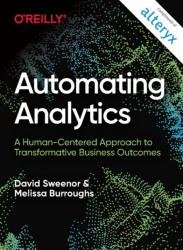Automating Analytics
- Добавил: literator
- Дата: 25-10-2021, 02:53
- Комментариев: 0
 Название: Automating Analytics: A Human-Centered Approach to Transformative Business Outcomes
Название: Automating Analytics: A Human-Centered Approach to Transformative Business OutcomesАвтор: David Sweenor, Melissa Burroughs
Издательство: O’Reilly Media, Inc.
Год: 2021-10-22
Страниц: 88
Язык: английский
Формат: epub
Размер: 10.2 MB
Do you have a method for seeing all the data that passes through your organization? The need to democratize access to data and analytics, automate complex and tedious business processes, and amplify human output has led to analytic process automation (APA). Thousands of organizations across nearly every business and industry vertical use this software to accelerate data-driven business outcomes.
We all know that data is important, but why is data so important to your business? Properly analyzed data transforms into information and actionable insights, which can be used for more effective decision making. It can tell you how your business is performing. It can highlight patterns and hidden trends, identify positive and negative influences, give insights on what steps to take in the future, and optimize the best choice among competing decisions. It is the lifeblood of decision making, and without it, you are simply guessing or relying on intuition.
The first place to examine is the data collection. It might be simple enough to look at an organization and guess at where its data comes from. Stores generate sales data. Schools generate student data. Hospitals generate patient data. People and equipment generate data all the time with their connected devices.
Data needs to be transformed into information and insights. How does this happen? How do we turn millions or billions of rows and thousands of columns of data into something that is easy to understand and interpret—something where the insights jump out at you?
Many organizations turn to data scientists. These data experts apply extensive statistical and computer science knowledge to identify patterns, trends, and outliers in data, then combine these elements with probability to determine what might impact the company in the future. They employ predictive analytic and ML techniques to perform the analysis and generate insights and predictions; however, this process is complicated and time-consuming. Data scientists use statistical coding languages, such as R, Python, and Julia, to tackle the complexity and depth of their work and enable them to analyze data more quickly and thoroughly.
Analytics automation simplifies the process for insight generation. By providing an intuitive, easy-to-use, graphical user interface, it provides a method for business users to transform data into insights. It also provides methods for analysts to develop workflows and building blocks that can be used by others to automate business processes. Your employees don’t need to understand the methodology for pulling, cleaning, and joining data in the tool if your analysts tackle that part of the process for them. Instead, your employees can focus on using the tool to ingest data or build insights relevant to their specific needs.
Скачать Automating Analytics
[related-news] [/related-news]
Внимание
Уважаемый посетитель, Вы зашли на сайт как незарегистрированный пользователь.
Мы рекомендуем Вам зарегистрироваться либо войти на сайт под своим именем.
Уважаемый посетитель, Вы зашли на сайт как незарегистрированный пользователь.
Мы рекомендуем Вам зарегистрироваться либо войти на сайт под своим именем.
